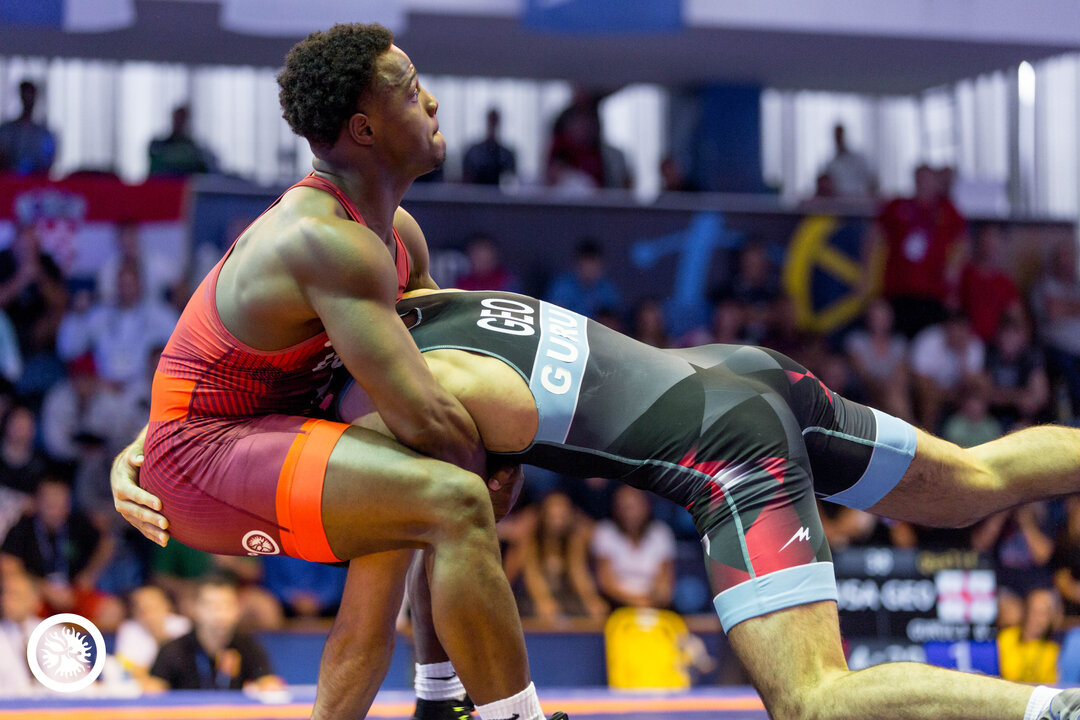India Inserts Trio into #Trnava2018 Greco-Roman Semifinals
Monday, September 17, 2018 - 13:47 By Eric Olanowski

TRNAVA, Slovakia (September 17) – The biggest surprise of the opening round at the #Trnava2018 2018 Junior World Championships was India inserting three wrestlers into tonight’s Greco-Roman semifinals.
Led by last year’s Tampere bronze medalist Sajan SAJAN (IND), along with Vijay VIJAY (IND) and Sagar SAGAR (IND), India wrap up the first session that saw seven wins and only two defeats.
Sajan, one of four returning 74kg Junior World medalists, will compete against Dmytro GARDUBEI (UKR) in the 77kg semifinals. The winner of that bout will have the opportunity to wrestle against the winner of reigning world champion Kamal BEY (USA) and Russia’s Islam OPIEV for the gold medal.
 df. Beka GURULI (GEO) -by VSU1, 9 - 1.jpg)
Kamal BEY (USA), reigning World champion looks for a life in the opening round of the 2018 Junior World Championships. (Photo by Max Rose-Fyne)
Bey, arguably the most electrifying Junior wrestler in the world, made the semifinals with an opening round technical superiority victory that was followed by two falls.
Opiev, one of three Russians to make the semifinals stunned the Trnava crowd, upsetting reigning World runner-up Akzhol MAKHMUDOV (KGZ), 1-1 in the 77kg quarterfinals. Opiev’s win stopped the potential 74kg rematch of last year’s Tampere World Championships between Bey and Makhmudov, a match that United World Wrestling voted as the No. 2 Greco-Roman match of the year.
Iran became the third nation to insert three wrestlers into semifinals with quarterfinal wins from Pouya NASERPOUR (IRI) (55kg), Amin MIRZAZADEH (IRI) (130kg), and Mohammadhadi SARAVI (IRI) (87kg).
Semifinal action will resume tonight at 18:00.
SEMIFINALS
55kg
Nurtazin KERIMBERDI UULU (KGZ) vs. Pouya NASERPOUR (IRI)
Vijay VIJAY (IND) vs. Tigran MINASYAN (ARM)
63kg
Azamat KAIROV (RUS) vs. Erbol BAKIROV (KGZ)
Sagar SAGAR (IND) vs. Hassan Hassan MOHAMED (EGY)
77kg
Kamal Ameer BEY (USA) vs. Islam OPIEV (RUS)
Dmytro GARDUBEI (UKR) vs. Sajan SAJAN (IND)
87kg
Ilia ERMOLENKO (RUS) vs. Mohammadhadi SARAVI (IRI)
Nazarshah FATULLAYEV (AZE) vs. Ramon Rainer BETSCHART (SUI)
130kg
Cohlton Michael SCHULTZ (USA) vs. David OVASAPYAN (ARM)
Beka MAKARIDZE (GEO) vs. Amin MIRZAZADEH (IRI)


 Women's Wrestling at the 2004 Athens Olympic Games. (Photo: United World Wrestling / Martin Gabor)
Women's Wrestling at the 2004 Athens Olympic Games. (Photo: United World Wrestling / Martin Gabor) Tayla FORD (NZL) is the first wrestler from New Zealand who will compete at the Olympics. (Photo: United World Wrestling / Amirreza Aliasgari)
Tayla FORD (NZL) is the first wrestler from New Zealand who will compete at the Olympics. (Photo: United World Wrestling / Amirreza Aliasgari)
Share your thoughts.
Comments